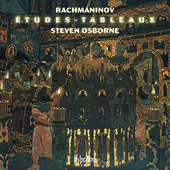
DEFINITIVE RECORDINGS

While Sergei Rachmaninov (1873-1943) was still entirely under the spell of Brahms and Chopin when he composed the Études-tableaux Op. 33 in 1911, no more than five years later he was deep into Scriabin territory when he wrote his Études-tableaux Op. 39. Although pianistically advanced pieces, the Op. 33 set is rather formal in style, harmonically stable and reserved, with the main musical idea always clearly defined, therefore true exemplifications of what a technical piano study should be. The tableaux (canvas) appendage really comes into play within the Op. 39 set where the writing is complex, the intervals wide, the harmonies distant, the main musical motif buried deep within a flurry of notes, and where passion is impetuous and the imagination soars. It leaves the interpretation door wide open for pianists to draw from, and for the listener a blank canvas on which to sketch vivid imagery.
Pianist Steven Osborne is part of that elite group of musicians that make themselves inconspicuous when they play. What I mean is that when you listen to him play, you don't hear or visualize a person sitting at a keyboard, struggling with the material, or imposing all sorts of mannerisms on the instrument. You only hear Rachmaninov's imagination and creative power coming through. The music breathes and glows from within and the instrument and player vanish from the picture. Even in the thorniest and complex passages, Osborne clearly articulates and accents the key notes, bringing them out as if they were landmarks on a road map, and as soon as he's played the first note, he already has the last one in his sights. It's playing on a superior level. I keep listening over and over again to the Op. 39 no. 1 and Op. 39 no. 5 because I can't believe what I'm hearing. The music speaks for itself and becomes a force of its own that pulls you deeper and deeper into Rachmaninov's mind.
Jean-Yves Duperron - July 2018